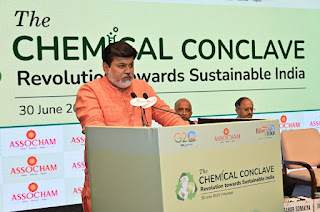Maharashtra would contribute $1 Trillion to India’s $5 trillion economy goal
Maharashtra would contribute $1 Trillion to India’s $5 trillion economy goal
Mumbai, June 30th 2023 : Maharashtra government is taking all the adequate policy measures and setting up infrastructure facilities to ensure that it becomes the top investment destination in India, stated the Maharashtra Industry Minister, Shri Uday Samant at the” Chemical Conclave- Revolution Towards Sustainable India” organized by the apex industry body ASSOCHAM in Mumbai.
Speaking at the event, Shri Samant stated that “This government has already put an IT policy in place and is taking all the adequate steps to attract industries. We have also ensured that all the infrastructure facilities are in place to attract foreign investments,” he explained.
Shri Samant informed that the government has kept a target of contributing almost $1 trillion to the honorable Prime Minister’s vision of making India a $5 trillion economy. “The same is not possible with out the support of the industries. It is a collaborative effort. We also need to ensure that all the industrial projects that are set up in the state are green projects to reduce our carbon footprint,” he pointed out.
According to the state industry minister, Maharashtra has around 13 chemical zone and there are plans to set up several more in the state to increase employment opportunities. “The biggest fear that people have is that chemical industries may pollute the nature and the ecosystem. We need to assure them that our chemical projects would be totally green and sustainable and would help them in the future. If we are able to do that, then the people of Maharashtra would welcome you with open arms,” he added.
Shri Ajay Singh President, Assocham & Chairman and Managing Director SpiceJet Ltd informed that the chemical industry has registered $30 billion in exports. “Going forward, the chemical industry has a big role to play in India’s goal to becoming a $5 trillion economy,” he explained.
Shri Singh also mentioned that Maharashtra has always been an industrial state and has formulated pro industry policies. “The honorable Prime Minister has kept a target of making India into a fully developed country by the year 2047. If that has to happen, Maharashtra will be playing a big role in the future as well,” he added.
Shri Shantanu Bhadkamkar Chairman, ASSOCHAM Maharashtra State Development Council & Managing Director, ATC Group explained that the chemical industry is the fastest growing industry in the country.
“Maharashtra's chemical industry is poised to lead the way as the fastest growing sector in the country. With the world's attention turning towards India for thought leadership, Maharashtra stands at the forefront, ready to shape the future of the global chemical industry,” he added.
Shri Samir Somaiya, Chairman & Managing Director Godavari Biorefineries Ltd explained that almost 85 percent of the fuel consumption of the world still comes from fossil sources.
“Reducing our carbon footprint is not just a responsibility, but an opportunity for sustainable growth. The Indian government's 'Panchamrit' initiative is a game-changer for industries, offering a holistic approach to minimize environmental impact. By embracing Panchamrit, industries can unlock a new era of innovation, efficiency, and competitiveness, while simultaneously contributing to a greener and healthier future for all." He said.
Mr. Aashish Kasad, EY India National Leader - Chemicals and Agriculture sector; India Region Diversity & Inclusiveness Business Sponsor - The fast-paced growth of the Indian specialty chemicals industry is inevitable. India is emerging as a preferred manufacturing hub for specialty chemicals for domestic and export markets. Today’s event has brought together key stakeholders to discuss and exchange ideas and shape the future of this dynamic industry. The EY-ASSOCHAM report launched today highlights the impact of the evolving Indian macroeconomic outlook and geopolitics on the landscape of the Indian specialty chemicals market as well as the need for companies to ensure sustainable and transformative growth to make the quantum leap.


Comments
Post a Comment